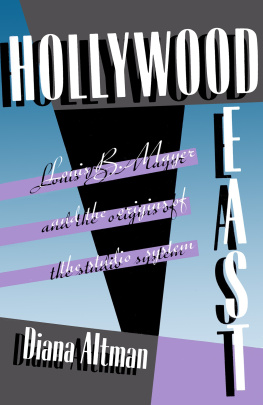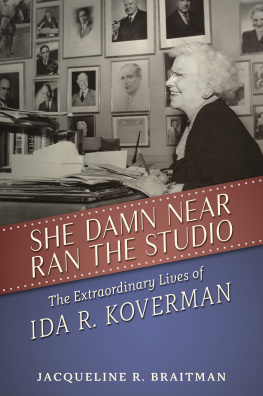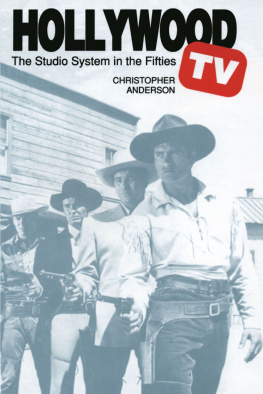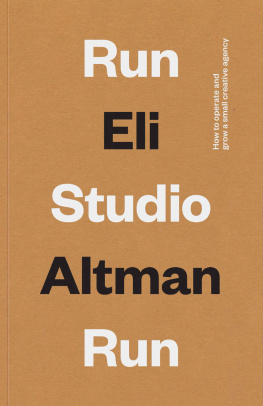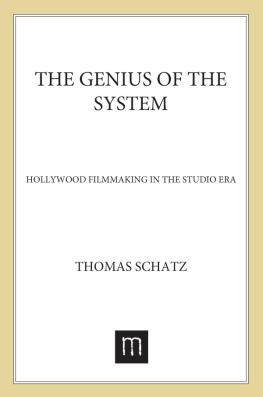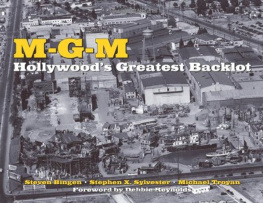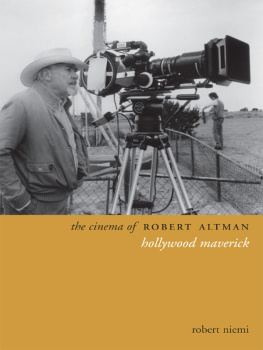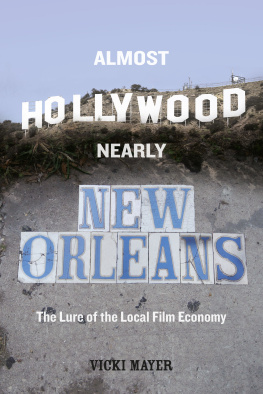Hollywood East
Louis B. Mayer and the Origins of the Studio System
By Diana Altman
For Richard
The verb TO FILM having gained currency, it must be graciously admitted to the language. It will soon be in the advanced dictionaries and it must be recognized. The old idea of protecting the English language from invasion is extinct. To film means to make a picture for a movie show. Movie is a tolerably new word, too, but all the elite use it.
New York Times, May 1914
The policy is to give as much as you can for the money. I suppose that is the secret of success in the show business.
Sidney R. Kent, 1927
General Manager,
Paramount-Famous-Lasky Corporation
And I will sing of heroism from an American point of view.
Walt Whitman
Preface
The myth is that Louis B. Mayer was a colossus with a volcano inside instead of a heart. After a childhood as squalid as his rotten personality deserved, so the tale goes, he sprang into Hollywood where he strode around doing whatever he wanted.
Truth is, he was middle-aged before people noticed that he had made a difference. The first film history, A Million and One Nights by Terry Ramsaye (1926), mentioned the forty-year-old Louis B. Mayer only twice: first, in a list of officers of the 1915 Metro Picture Corporation, Louis B. Mayer of Boston, secretary, and second, as the also-ran company that Marcus Loew acquired when Metro and Goldwyn mergedMarcus Loew, once a New York newsboy, now holding the incorporated bouquet entitled Metro-Goldwyn-Mayer, taking its name from two companies and Louis B. Mayer of Boston The author devotes many pages to men he thought were really important: Otway Latham, Mark Dintenfass, Richard Rowland, and others posterity seldom mentions.
Far from ruling Hollywood, Louis B. Mayer, as head of production at the Metro-Goldwvn-Maver studio in California from 1924-1951, was answerable to his boss in New York, first Marcus Loew, then Nicholas Schenck. Metro-Goldwyn-Mayer was just one of 124 subsidiary companies owned by Loews Inc., a multibillion dollar concern with headquarters in Times Square.
Until the sixties the film industry in America had two capitals, Hollywood and New York. New York was the financial center of the industry and conducted the lucrative foreign export trade. Decisions about budgets and product were made at corporate headquarters on the east coast, not at the studios on the west coast. Clark Gable may have posed for cameras in Culver City, but his paycheck was signed at 1540 Broadway, across the street from the Camel Cigarette sign blowing smoke rings. When Adolph Zukor, the founder of Paramount Pictures, went to work in the morning, it was to an office in the Paramount building on Broadway. Marcus Loew, the founder of M-G-Ms parent company, Loews Inc., lived on Long Island and went to work in his office in Times Square. Albert Warner, one of the brothers, ran Warner Bros, headquarters in New York, as David Sarnoff ran RKOs headquarters there. William Fox, who founded the Fox part of Twentieth Century-Fox, had two offices in New York, one at the Roxy Theater and the other at his newsreel factory on Tenth Avenue and Fifty-fourth Street.
Yet recent film histories discount the influence of New York, mentioning it merely as some small speck connected to Hollywood by a telephone wire. If Hollywood had collapsed, the film industry in America could have continued pretty much as it was, simply setting up studios in some other sunny place. But when New York collapsed, the whole industry changed completely.
In recent film history, Marcus Loew, Adolph Zukor, the Warner brothers, and William Fox have all become isolated from the corporations they founded and have grown into mythical giants who made arbitrary decisions based on their personal needs, as if every decision came from being holed up somewhere in isolation. As if they, all by themselves, could make a product that interested the whole world.
All corporations have a life of their own, and the film corporations were no different. Except that the public, through dozens of censorship organizations, including the powerful Legion of Decency controlled by the Pope in Rome, exerted an outside influence that is not usually so immediate in corporate life.
Because of his genius for self-promotion, Louis B. Mayer has emerged as the Zeus of film pioneers. Hes probably laughing in his grave. He started out in his youth as an entrepreneur, but he ended up an employeean internationally famous, politically powerful employee. Which is to say, he could be fired. And he was.
Louis B. Mayer-bashing is a current fad. Fact is, there were people so loyal they worked for him thirty and forty years. My father was one of them.
Al Altman was a talent scout for Metro-Goldwyn-Mayer from the time the company was founded in 1924 until the early sixties, when the headquarters moved out of New York and the New York talent department was dissolved. My father and Louie Mayer met in Boston when Al was nineteen and Louie was about thirty. Their satisfying relationship lasted until Louie died at age seventy-two. They were both prudish men; they were both devoted to their mothers. They knew what it was to grow up poor and how wonderful it was to finally be able to afford to dress well. They were both showmen and had an eye for quality. They kept in close touch though Al worked in New York at the home office and Louie was at the studio on the west coast.
The founders of the film industry in the United States were the men who invented the machinesthe projectors and cameras. But it was the men who loved the show business who made the American film industry dominant in the world. They began as theater owners who grew to love their audience and to believe that, where entertainment is concerned, the public is never wrong.
Acknowledgments
The following people were most generous with their help:
Gregory Laing, head of special collections at the Haverhill Public Library, has such a profound knowledge of Haverhill he made doing research there fun. When he suggested I try the corn chowder at Haverhills A-1 Deli, I did, and discovered the best restaurant in Massachusetts. Thanks to Lyndas mother, Elaine Demerritt, who introduced me to Beatrice Malbon, whose father was an usher at the Cozy Nickel. Thanks to Dee Doucett and Redd Slavit, whose fathers knew Louis B. Mayer when. Bertha Woodman has written the definitive book about Haverhills early Jewish community and understood how much encouragement writing a book requires. David Joyall at the Northeast Document Conservation Center was a doll to give me a break on the price of restoring an old photo, and Charles Hillner, III, whose grandfather played piano in Louie Mayers theater, was generous with his enthusiasm for my project.
Thanks to Myer Levin and his sister, Edna Grace, who spoke to me for a long time about their father, Louis B. Mayers first production partner. Dr. Arthur Linenthal, who has written a great history of Bostons Jewish hospitals, became my friend while I was doing this book. Thanks to Betty Gordon in California, who put me in touch with Marion Bever in Cambridge, whose father was Mayers Boston partner in the theater business.
At the Glen Gove Library on Long Island, thanks to Jim Brown. At the Huntington Historical Society, thanks to Mitzi Caputo, and at the Newton Free Library, thanks to the entire staff, especially Cathy Garoian and Ernie Kruhmin. Brian Smarsh at the Georgetown University Library selected many of the photographs used on these pages. He found them in the fabulous Quigley Collection donated by Martin Quigley, Jr., who was generous with his time.
Thanks to Howard Bass at the New York Jockey Club, who probably doesnt remember how much time he spent researching Louis B. Mayers racehorse history for me. Thanks to Karl Fasick for lending me that Dore Schary book and telling me about his days as a salesman for M-G-M. And Russell Merritt, the film writer, probably forgot that long telephone conversation we had years ago in which he encouraged me.
Next page
